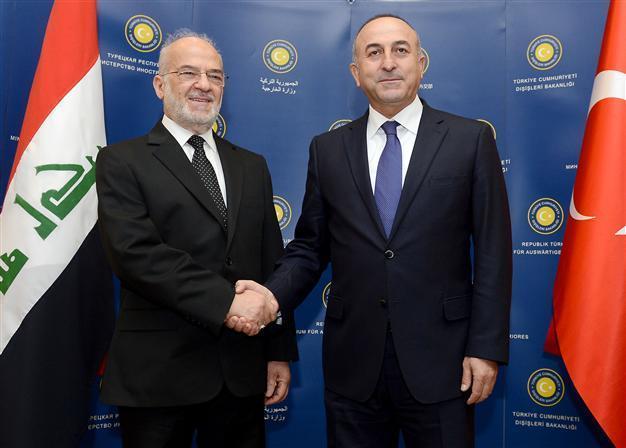Turkey and Iraq vow to reboot sour relations
ANKARA

Turkish Foreign Minister Mevlüt Çavuşoğlu (R) and Iraqi Foreign Minister İbrahim al-Jaafari pose during a joint conference in Ankara. AA photo
Turkey and Iraq vowed to leave their sour past behind them and rejuvenate their relations during an official visit to Ankara by Iraq’s foreign minister.
“We can say a new page has been opened in our relations with this visit,” Turkish Foreign Minister Mevlüt Çavuşoğlu said during a joint conference with Iraqi Foreign Minister İbrahim al-Jaafari on Nov. 5.
“The problems in Iraq were caused by the previous administration,” Çavuşoğlu said, referring to strained relations during the rule of former Iraqi Prime Minister Nouri al-Maliki, who was replaced by Haider al-Abadi in early September.
“We want to improve our political and economic relations with this new process. In this regard, we welcome this new beginning with Iraq,” he added.
The two foreign ministers signed a memorandum of understanding regarding the mutual abolition of visas for holders of diplomatic service and special passports.
Relations between the two countries have soured considerably in recent years, partly due to oil agreements signed between Turkey and Iraq’s autonomous Kurdish Regional Government (KRG) without the consent of the central Iraqi government.
Ties were further strained after Turkey gave refuge to fugitive Iraqi Vice President Tariq al-Hashimi in 2012.
Iraq doesn’t want foreign fightersThe Iraqi minister also underlined the importance of the two countries’ “deep-rooted” relations, particularly in the face of an escalating threat from the Islamic State of Iraq and the Levant (ISIL), the jihadist organization that has overtaken vast portions of Iraq and Syria.
“Our relations have strategic roots. We have multi-dimensional relations, which are very important to both economic and political matters,” al-Jaafari said during the news conference.
The minister also asserted that Baghdad did not want foreign fighters on Iraqi soil to combat ISIL, but would accept training from abroad for its soldiers.
“Iraq rejects foreign soldiers coming [to its soil]. It will fulfill its own duty but will also accept any kind of help that will come from its brothers, because this will add power to Iraq’s power. We can tackle ISIL this way,” he said, adding that he hoped Turkey’s support for Iraq would continue.
However, al-Jaafari also made clear that the new government was sticking to the position that the KRG had no right to unilaterally export its oil through a pipeline via Turkey.
“According to the Iraqi Constitution, oil sales are the business of the central government,” he added.
